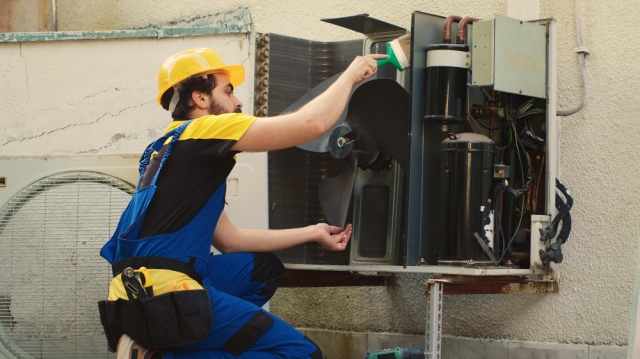When your AC starts to fail, it's easy to panic. Sky-high repair bills, increased energy costs, and hot living spaces require quick action. Yet, before you go ahead and fix your current unit or shell out for a new one, you need to think about your options. The right choice rests on a series of considerations, everything from your system's age and well-being to energy efficiency, the frequency of the AC repair in Lockport, NY, and cost. You may save thousands by making an informed decision and greatly increase the comfort and value of your home.
1. Considering the Age and Efficiency of Your System
The average AC lasts 10 to 15 years. If your unit is over ten years old, it's probably running less than efficiently and will soon require constant maintenance. The older the units are, the more difficult they have to maintain steady temperatures, especially at the height of summer. The newer models, however, come with new features and energy ratings that substantially cut down on your utility costs. When an aging unit starts to break down, it is often cheaper to invest in a replacement that is energy-saving and reliable.
2. Repair Price vs. Replacement Cost
Perhaps the easiest way to determine whether to replace or repair is to use the 50% rule. When the cost of repair approaches or exceeds half the cost of a new system, replacement will often be the best financial decision. A minor issue like a faulty capacitor or blown fuse may be a simple fix, but installing a new evaporator coil or compressor can be pricey. Ongoing repairs also show that your system is growing old as a system. Spending a little extra up front on a new one will keep you from getting caught in the cycle of costly short-term fixes.
3. Considering Energy Efficiency and Utility Bills
ACs are far more energy efficient now than in the past, due in large measure to newer SEER (Seasonal Energy Efficiency Ratio) standards. If your unit has a SEER rating of less than 13, it's out of date by today's standards. An improved SEER rating not only lowers your carbon impact but also translates to substantial reductions in monthly utility costs. Repairs may be able to fix things in the short term, but they won't add to the efficiency of your system. A replacement may cost more upfront but delivers consistent, long-term cost benefits.
4. Determining Indoor Comfort and Indoor Air Quality
In the long term, an old or faulty AC can have an effect on indoor air quality in your home. Poor airflow, uneven cooling, high humidity, and strange noises are all signs that your AC isn't functioning correctly. Repairs can even, at times, address these symptoms, but they cannot restore ultimate indoor comfort. A new system offers not only quiet operation and steady temperature control but also enhanced filtration and humidity regulation. In case of comfort and indoor air quality compromise, a new unit may be a better choice.
5. Looking at Frequency of Repairs and Reliability
If your AC needs to be serviced a number of times a year, it's a sign of trouble. Systematic breakdowns mean your system is reaching the end of its useful life and becoming less reliable. Even minor issues add up when they occur repeatedly, both in terms of cost and inconvenience. One repair may be a temporary rescue, but frequent service calls can quickly surpass the cost of a new system. For peace of mind and dependable cooling, replacing a temperamental system is generally the best solution.
Coming to a decision between AC replacement and repair is not always simple, but considering the factors tactically leads you to make the right choice. Examining your current unit's age, efficiency, cost, comfort level, and reliability allows you to move towards a solution that will be to your long-term advantage. A simple fix will suffice in a few instances, but where issues persist, a full replacement can increase your property value and reduce your energy bills. The idea is not to allow your unit to fail entirely but to act at the onset of symptoms. Whatever you decide, investing in your home's comfort always pays.
If your AC isn’t performing the way it should, now is the time to act. Schedule a professional inspection from the experts at The Plumber Heating and Cooling at 716-260-1380 and get expert advice tailored to your system’s condition. With the right guidance, you can stay cool and save money all season long.
FAQs
1. How long should the average AC system last before being replaced?
The average system lasts anywhere from 10 to 15 years when well-maintained. If your AC is more than 10 years old and requires repair often, it might be time to think about replacement.
2. Will replacing my AC with a newer model really save me money on my monthly energy bills?
Yes, newer units with higher SEER ratings are much more energy efficient and can really lower your electricity bills over time.






